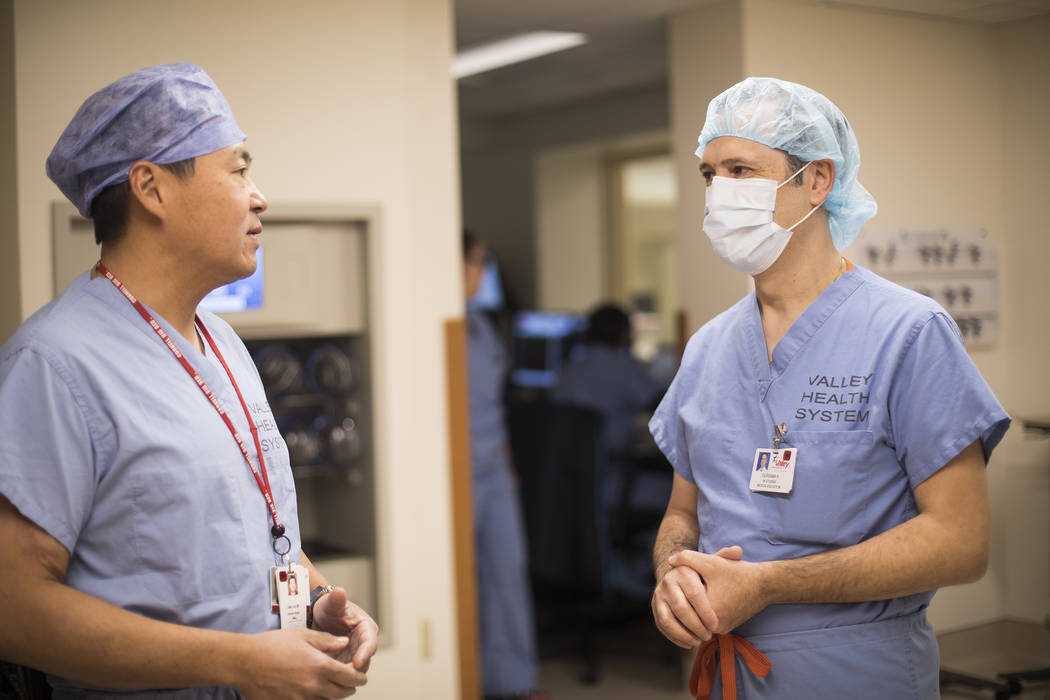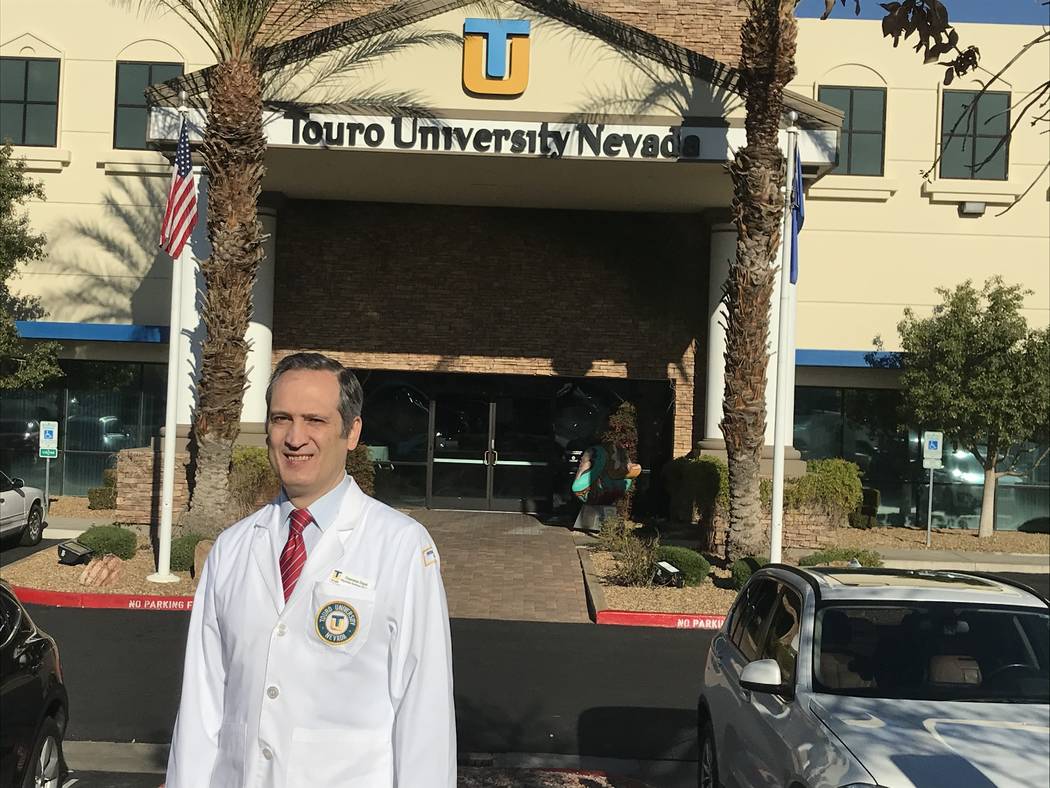Former Syrian doctor goes back to school in Las Vegas
After Syria’s civil war started in 2011, physician Oussama “Sam” Hajal wasn’t sure he’d make it home safely from work each night.
One morning in November 2014, Hajal was working at a hospital in Damascus when he was called in for a consult in the emergency room. He saw a pale man covered in blood and realized it was his father, who had been hit by a mortar.
His father underwent two surgeries and months of physical therapy, and was left with partial use of his leg.
More than a decade earlier — in 2002 — Hajal had applied for a U.S. immigrant visa. As the years passed, “I kind of forgot about it,” he told the Las Vegas Review-Journal during a recent interview.
In 2015, he unexpectedly received a letter saying he and his family had been granted visas and needed to complete paperwork, he said. They arrived in Las Vegas in November 2015.
Now, 51-year-old Hajal lives with his wife and their two daughters — ages 10 and 7 — in North Las Vegas. He’s about halfway through a 28-month physician assistant program at Touro University Nevada in Henderson and is on track to graduate in November.
Program director Phil Tobin said he was “definitely impressed” by Hajal during an admissions interview.
“It really triggered my heart that he had given up a very successful practice and being recognized all for the safety of his family,” Tobin said.
In Syria, Hajal was a pulmonologist, meaning he specialized in conditions involving the respiratory system, including the lungs. Despite having two decades of experience as a medical doctor, he wasn’t able to simply move to the U.S. and pick up where he left off. His options included taking exams and applying for a residency program, but that would require many years of schooling.
Hajal faced a tough choice: whether to spend years in school in order to continue his career in medicine or get whatever job he could find to pay the bills.
It was hard for Hajal to imagine giving up his medical career.
“It’s the only thing I love to do and want to do,” he said.
Touro University Nevada usually has one or two foreign medical graduates contact the school to ask questions during each application cycle for the physician assistant program, Tobin said.
Pursuing a career in medicine
Hajal said he became a physician as a way to help people — not to make money.
“I still believe medicine is about humanism,” he said, adding that he’s happy to be in Las Vegas and for the opportunity to practice medicine again. And he wants to get back to working in pulmonology — his specialty in Syria.
When Hajal was in high school, his mother was diagnosed with severe asthma. Over time, her asthma attacks became more frequent and she was hospitalized more often.
Watching medical professionals — and admiring their work — coupled with frustration knowing his mother was suffering and there was nothing he could do spurred Hajal to pursue a career in medicine.
Hajal graduated from Damascus University in 1992 and completed a residency program in pulmonology. As a medical student in Syria, “almost all of us dream of coming to the United States to continue our education,” he said, but he was denied a visa.
Instead, he went to France, where he spent 4 1/2 years.
Hajal returned to Syria in 2004, opening a private clinic and working at a public hospital. He gave lectures, participated in conferences and was a member of the Syrian Board Committees of Pulmonary Medicine and Intensive Care Medicine.
After his marriage and the birth of his daughters, his family’s lives changed drastically.
Life in Syria during the civil war
Hajal’s parents and his brothers were living in Las Vegas when Syria’s civil war started.
Hajal’s brother came to Los Angeles in 1998 because part of their family — including his aunt and uncle — were living there. He moved to Las Vegas in the early 2000s because he worked in the hospitality field and dreamed of having his own restaurant.
Hajal was in Syria and said his parents, who were worried about him, defied his advice and moved back from the U.S.
Being in Damascus during the civil war, Hajal said, was “very bad.”
The Syrian Observatory for Human Rights estimated in 2018 about 511,000 people have died as a result of the war. More than 5.6 million people have fled their homes since the civil war began, according to the United Nations High Commissioner for Refugees.
Hajal’s oldest daughter went to school on and off for a total of six months over three years, from preschool through first grade, due to violence.
“When we heard about something happening at school, we kept her at home,” Hajal said.
When his daughters heard noises such as bombings, they’d cover their ears.
In the midst of the civil war, “that’s when we got the visa,” Hajal said, and “that’s why we did not hesitate” in deciding to come to the U.S.
What’s a physician assistant?
After arriving in Las Vegas, Hajal started asking his friends in the medical field about options for continuing his career. He learned about physician assistants.
They are “medical professionals who diagnose illness, develop and manage treatment plans, prescribe medications, and often serve as a patient’s principal healthcare provider,” according to the American Academy of PAs. They can work in primary or specialty care settings.
The physician assistant program at Touro takes about two years to complete, Hajal said, adding, “It was much easier than any other option.”
He wanted to stay in Las Vegas for school. It’s where his family lives, and the climate is similar to Syria’s, he said.
“We don’t like the cold very much,” Hajal said.
When Hajal contacted Touro to get information about admissions requirements for the PA program, he learned he’d have to take prerequisite classes. He spent three years at the College of Southern Nevada as a student and also instructed lab classes. Then, he applied for Touro’s physician assistant program.
The 28-month physician assistant program includes 16 months of didactic education — largely, classroom instruction — followed by 12 months of clinical rotations, meaning hands-on experience at medical offices and hospitals.
Most states have a law that requires physician assistants to have an agreement with a medical doctor in order to practice, according to the academy.
Those who work in a specialty — such as cardiothoracic surgery — handle tasks such as pre- and post-operative appointments and can be a first assistant for surgeries, Tobin said.
Nationwide, the median pay for physician assistants was $108,610 per year in 2018 and the number of jobs is expected to grow by 31 percentage points — much faster than average — between 2018 and 2028, according to the U.S. Bureau of Labor Statistics.
‘They thought I knew everything about medicine’
When his Touro classmates found out he was a physician in Syria, “they thought I knew everything about medicine, which is not true,” Hajal said.
Because he was a specialist in pulmonology, there were other aspects of medicine he wasn’t practicing daily, he said, and he had to revist them.
But Hajal’s expertise is helpful for Touro professors. When questions arose in class specific to pulmonology, they often looked to him for information.
Hajal is in his second year of Touro’s physician assistant program and is doing clinical rotations, each of which spans one month.
One of Hajal’s favorite rotations thus far was in an intensive care unit, he said. He also hopes to complete a rotation in pulmonology — specifically, in a setting where interventional procedures are performed.
Through clinical rotations, it’s the first time in nearly five years Hajal has dealt with patients.
“I am very eager to interact with patients again,” he said.
Hajal said he wants to encourage others who are in a similar situation — arriving in the United States and figuring out what to do next.
“They can go to school and start a new life,” he said.
The Associated Press contributed to this story.
Contact Julie Wootton-Greener at jgreener@reviewjournal.com or 702-387-2921. Follow @julieswootton on Twitter.
Immigration law
Since Oussama “Sam” Hajal’s family moved to the U.S., immigration policies have changed. The Trump administration issued a third version of a travel ban in December 2017, blocking citizens of five Muslim-majority countries and their immediate families from traveling or immigrating to the United States, according to The Associated Press. The ban — which affects Iran, Libya, Somalia, Syria, Yemen, North Korea and government representatives from Venezuela — was upheld by the Supreme Court in June 2018.
By the numbers
1,200: Approximate number of people who apply to Touro University Nevada’s physician assistant program each application cycle.
200: Approximate number of applicants invited to interview for a slot in the program.
70: Number of students in Oussama “Sam” Hajal’s physician assistant class.
80: Number of slots that will be available, starting in July, for the next incoming class.
40 percent: Graduates who work in primary care.
























